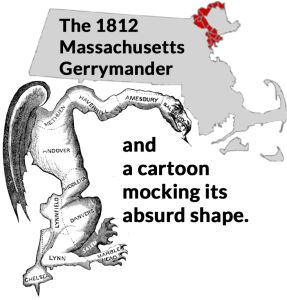Gerrymandering Robs Many Voters of a Meaningful Vote

© 2016 by reclaimtheamericandream.org. The article was written by Hedrick Smith, executive editor of reclaimtheamericandream.org.
Gerrymandering Undermines Our Democracy
In a prophetic column in early 2010, Republican strategist and political guru Karl Rove asserted: “He who controls redistricting can control Congress,” and that is just what Rove had his eye on doing for the GOP.
The cunning manipulation of political district lines by Democrats or Republicans to guarantee their own election and protect their lock on power has a long and byzantine history in American politics. But the black art of gerrymandering is now being carried to extremes. And it is undermining the integrity of American elections.
For now, as never before, sophisticated modern mapping software such as Maptitude, RedAppl, and autoBound, enables party strategists to stack the deck by carving and slicing neighborhoods down to the precise block or household in order to insure victory for their party.
In state after state, especially those with closed party primaries, gerrymandering distorts the overall popular vote, sometimes turning the results upside down. After the 2012 elections, for example, Congress did not accurately reflect the people’s votes.
Democratic candidates for the U.S. House of outpolled Republican candidates nationwide by roughly 1.4 million votes. But Republicans emerged with a 33-seat majority in the House, capitalizing on the crafty GOP gerrymandering devised by Rove and others.
Independents Are Robbed of Their Vote
So gerrymandering can and does rig partisan outcomes. But the most malignant effect of gerrymandering and party primaries is to disenfranchise tens of millions of independent voters, now roughly 40% of the U.S. electorate – more than in either major party.
In most districts of populous states, independents and members of the minority party are quite literally robbed of any meaningful vote for the U.S. House of Representatives, in election after election because they cannot vote in political party primaries, where the crucial election decision is often made.
Take Massachusetts, where American gerrymandering was born. In fact, we get the name gerrymandering from the salamander shape of one district as they stacked the district maps in 1812. Two centuries later, the Democrats still gerrymander the district lines in Massachusetts even though 62% of the state’s electorate are either registered Republicans or Independents.
Because Democrats doctor Congressional district maps to insure Democratic winners, the Democratic Party primary in Massachusetts de facto becomes the decisive election for the House. But the 62% get no vote in the Democratic primary and their votes in the general election don’t matter because gerrymandering has pre-cooked the outcome and deprived them of any real say in that election.
Read The Full Article Here.
Editor's note: This article originally published on Reclaim the American Dream's blog. It was republished with permission.




